He-said-I-was-hard-working课件7
he said i was hard-workingPPT教学课件
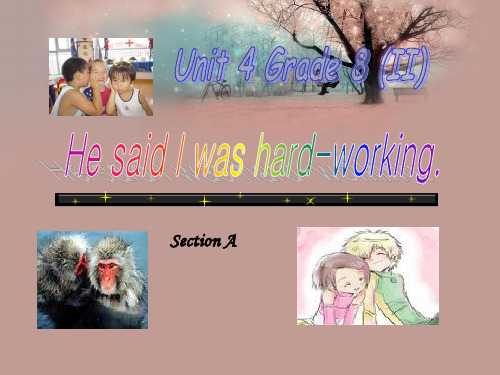
Word study
• ever 曾经;永远 adv. • mad 疯狂的;狂热的 adj. • anymore 再;还;今后 adv. • snack 小吃 n. • direct speech 直接引语 • reported speech; indirect speech 间接引语 • first of all 首先 • message 消息;信息 n. • pass on 传递 • suppose 假定;认为;期望 v. • be supposed to 被期望;被要求……
2. The teacher said, "My students are hard-working." The teacher said that _______________________.
3. Tom told Jane, " I will lend my bicycle to you." Tom told Jane that _______________________.
Marcia said …
He is serious.
Ben said …
She is friendly.
Ben said …
Change into reported speech
• 1. He said, “I live in Xiamen.” • 2. She said, “I’m interested in physics.” • 3. He said to me, “I will learn English
• 4. My friend said that she was sorry that she'd gotten mad.
• 5. She asked me why I wanted to do that.
Unit 4《He said I was hardworking》课件5(14页)(人
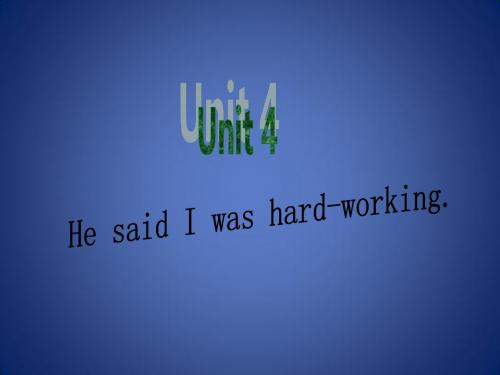
What did she say?
She said she was going to her house .
I can speak three languages.
What did she say?
He said he could speak three languages.
He said he would call his friend tomorrow.
Do you have any ideas about your weekends? Write down your plans. And exchange with your partner. You tell us what your partners will do on
A: What did your math teacher say?
B: He said I was hard-working.
A: And your Chinese teacher?
B: Not good. He said I wanglish teacher said I was making progress.
weekends.
(writing) I will go to visit the museum this weekend.
(reporting) He/She said he/she would go to visit the museum this weekend.
Self-evaluation
report card
What did your headteacher say? He/She said I was hard-working.
课件Unit_4_He_said_I_was_hard-working
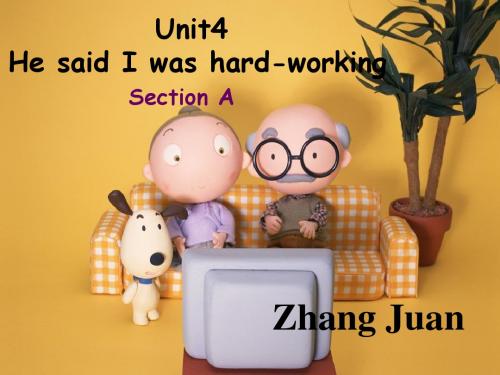
间接引语He said that he didn’t like cleaning his room
精讲点拨:直接
引语变为 间接引语需注意: 时态 人称 所有格
1.时态的变换:主句若为一般过去时从句则使用相 应的过去的某种时态
选择正确答案
1. He told Marcia he (will\would) call her tomorrow.
What did Lana say?
Lana said she was mad(生气) at Marcia.
She said, “ I’ m not going to her house on Friday night.”
What did Lana say?
She said she was not going to her house on Friday night.
2.Mary said:"I am studying Japanese.
2.Mary said she was studying Japanese.
3Susan said:"I go shopping every Sunday.
3.Susan said she went shopping every Sunday.
6.Linda said :"I go camping every week.
6.Linda said she went camping every week.
She said, “ I’m having a surprise party for Lana on Friday night.”
What did Marcia say? She said she was having a surprise party for Lana on Friday night. 为拉娜举办一个惊喜晚会
He said I was hard-working PPT课件 16 人教版

.
4.(Li Lei) I am learning to speak English. Li Lei said-h--e--w--a-s--le-a--r-n-i-n--g--to--s-p--e-a-k---E-n--g-l-i-s-h-.----------
1. She said, “I can speak English.” She said __s_h_e_ could speak English. 2.He said to me, “I will come to your直接引语间接引语
Direct speech
Reported speech
(1)人称作相应的变化
(2)时态作相应的变化
I am from Boxing.
She said she was from Boxing.
I like English.
He said he liked English.
He can speak Chinese. Lucy said he could speak Chinese.
2.(Mike)I go shopping every weekend. Mike said---h--e---w---e--n--t---s-h---o--p--p--i--n--g---e--v--e--r--y---w---e--e--k--e--n--d---.---------
八年级英语he-said-i-was-hard-working课件2_3990
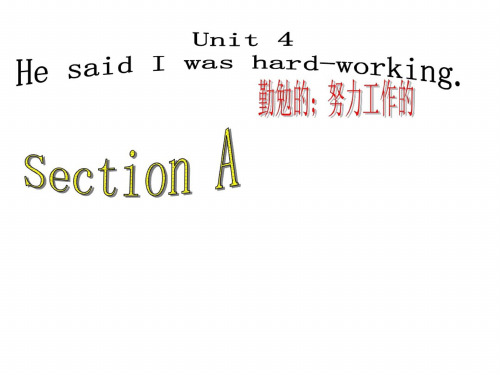
他的名字第一次走进我的日记本里,是在初二的那个暑假,一整船送葬队伍里,他第一个从船上跳下来,跳得不稳,往前跑了一个趔趄,红着脸低头从我们面前跑过去时,表弟打了个哈哈:“难怪 现在大家说他是10班的小白脸呢!”
我回头看了看他的背影,宽松的灰白色夹克,显得更是瘦削,走路时只顾低头望自己的脚尖,酒席间来来往往,他坐在人群间,似是与旁人毫无关联。
初三开学后,班级合并,我们又成了同班。他安安静静地坐在最后一排,老师们偶然会念到他的名字,他站起来,短暂的寂静过后,老师们最终无奈地选择让他坐下。我坐在最前排,偶然会回头看 一看,不记得从何时开始,他会抬眼瞥我一下,面无表情。途中如果遇到,亦是同样——我想我们甚至不能算是一个经纬度的,我们唯一相似的地方是我们都很安静——我安静地读书写作业,他安静地 神游遐想。
自那天起,我们似乎有了小秘密。我决定严严实实地守着这个小秘密。新星辰娱乐
临毕业时,他向我讨要了一张绘本封面的临幕图,一朵白莲跃出池面,原本是极其淡雅美好的一副画,却被我临摹得歪歪扭扭,连同毕业照片上我歪着头扎得极不对称的小辫儿一样,留在了那段歪 歪扭扭的童年记忆里。
人教版初二八年级英语下册 unit 4 he said i was hard-workingPPT课件
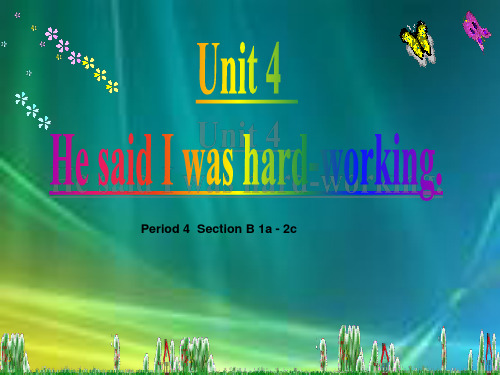
Alfar said He was better at dancing than playing the guitar.
I do well in singing .
Alfar said He did well in singing.
I am too busy .
Alfar said
She was too busy.
I will practice dancing.
Alfar said He would practice dancing.
I am playing the trumpet.
Alfar said He was playing the trumpet.
I will study English.
Alfar said
was good at speaking.
. ?
Dad: What did your history teacher say
How about
Mother: That’s nice.
Boy: And Mr. Ricardo said I was hard- working. Dad: What does he teach again? Boy: He’s my
Period 4 Section B 1a - 2c
I am good at ห้องสมุดไป่ตู้laying the guitar.
Alfar said
He was good at playing the guitar.
I am better at dancing than playing the guitar.
2a Listen and fill in the speech bubbles.
He said I was hard-working PPT课件 31 人教版

2. Lana said she wasn’t mad at Marcia anymore. true 3. Lana said that she wouldn’t go to Marcia’s house false
•
15、不管怎样,仍要坚持,没有梦想,永远到不了远方。
•
16、心态决定命运,自信走向成功。
•
17、第一个青春是上帝给的;第二个的青春是靠自己努力的。
•
18、励志照亮人生,创业改变命运。
•
19、就算生活让你再蛋疼,也要笑着学会忍。
•
20、当你能飞的时候就不要放弃飞。
•
21、所有欺骗中,自欺是最为严重的。
I don’t like cleaning the room.
What did he say?
He said he didn’t like cleaning the room.
I can fly. What did he say?
He said he could fly.
I will go to the park.
Sunday ,”the boy said.
7. The boy said theyw_e_n__t ________ to school
everyday except Saturday and Sunrn?
•
1、再长的路一步一步得走也能走到终点,再近的距离不迈开第一步永远也不会到达。
They said they were swimming.
I will play the trumpet.
八年级英语he-said-i-was-hard-working课件2_3990
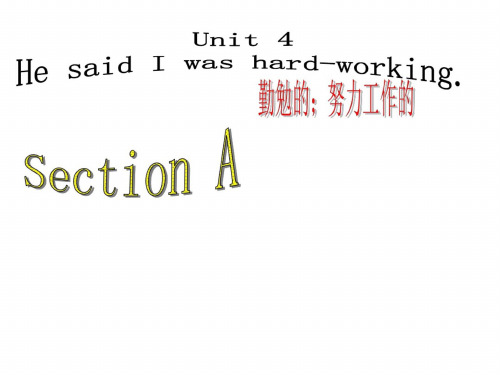
1 山城的树芽风是从正月底的黄昏刮起来的。树芽风的感觉是飘扬的。行走在山道上,仿佛能听见树芽在风里噌蹭上的。清丽美妙。婉 转娇啼,充满呼唤的张扬。人的心情也是飘扬的。那种要飘飞的感觉融化在风中。那种转瞬即逝的美妙,在风中轻轻飞扬。
优品课件之He said I was hardworking

He said I was hardworkingUnit 4 He said I was hard-working. 1.Teaching Aims and Demands (1)Knowledge Object In this unit students learn to report what someone said. (2)Ability Objects To improve students’ abilities of listening,speaking,reading and writing. To improve students’ ability of communication. To improve students’ ability of integrating skills. (3)Sensibility and Value To enable to cooperate with other students,help each other to complete the tasks together. To be able to express one’s feeling in English. 2.Teaching Key Point To master the key vocabulary and the target language in this unit. 3.Teaching Difficulty To train students how to use the target language by reading and writing. 4.Studying Way To teach students how to listen for key words. nguage Function Report what someone said. 6.Target Language ―What did your math teacher say? ―He said I was hard-working. ―I can speak three languages. ―What did she say? ―She said she could speak three languages. 7.Structures Reported speech. Simple past tense. Can for ability. 8.Vocabularyhard-working;surprise;party;report;card;speaking;listening; average;OK 9.Recycling soapopera;house;drinks;snacks;lazy;beach;tomorrow;math;Spanish; history;science Why... I can... good;Friday;Saturday10.Learning Strategies Listening for key words.Self-evaluating. 11.Teaching Time Seven periods.The First Period Ⅰ.Teaching Aims and Demands 1.Knowledge Objects (1)Key vocabulary report;surprise;party;be mad at (2)Target language ―What did Marcia say? ―She said she was having a surprise party for Lana on Friday night. Groupwork(3)Listening practice (4)Speaking practice 2.Ability Objects To train students’ ability of listening and speaking.3.Sensibility and Value To help students realize the importance of cooperation. To raise students’ interest in learning English. Ⅱ.Teaching Key Points Key vocabulary. Target language. Ⅲ.Teaching Difficulties Groupwork. Speaking practice. Ⅳ.Teaching Methods Listening an d speaking methods. Cooperating method. Talking methods. Communicative approach. Ⅴ.Teaching Aids A tape recorder. A projector. Ⅵ.Teaching Proceduresthe new words on the screen and learn the new words.First ask students read.Correct the pronunciation. Read the new words to studentsfour or five students to sit in a row in the front of the room.Ask each of the students what they are going to do after school.[T=Teacher,S=Student] T:What are you going to do after school? S1:I’m going home. T:OK.And what are you going to do? S2:I’m going to do my homework. Then write the words He said and She said on the board. T:These students talked about what they are going to do after school.How would you tell a friend in another class what each student said?Can you use the words He said or She said?What did Sarah say? S2:She said,“I am going home after school.”T:That’s correct.The words she said were,“I am going home after school.”But when we tell someone else these words we sometimes say it this way:She said she was going home after school.Class repeat.She said she was going home after school. Ss:She said she was going home after school. Repeat this process with the sentences of several other students.Then write these two sentences on the board one under the other:I am goinghome after school.She said she was going home afterschool.Circle the words going home after school in both sentences.Point to what is left and say,In this unit we’re going to learn to use words like this to report what someonevocabulary and provides oral practice using the target language. First ask a student to read the four questions in the box. S:What is a soap opera? Do you ever watch soap operas? What are some soap operas you know? What are some things that happen on soap operas? Then write the words soap opera on the board.Explain what a soap opera is. (A soap opera is a TV show that is on every day and that shows the good things and the bad things that happen to a group of friends and family members.) For example,I Love My Family. Encourage students to say some soap operas in English or in Chinese. Point to the TV screens in the picture.Ask one student to read what Marcia (the blond woman on the TV screen) says in the first picture:I’m having a surprise party for Lana on Friday night.Then ask other students to read what the girls watching TV say:What did Marcia say?She said she was having a surprise party for Lana on Friday night. Point to the other TV screens in the picture and have other students read the words in those TV screens. S:I’m mad at Marcia. I’m not going to her h ouse on Friday night. Lana thinks she’s coming to my house to study. T:Now,answer these questions and talk about some soap operas.(Point to the four questions in the box.) Help students form small groups.Students begin to talk about the questions. Focus on the ideas the students are talking about.When a student starts to tell what another student said,help that student make a sentence,such as:Anna said she didn’t watch soap operas.Billgives students practice in understanding the target languagein spoken conversation. Ask students to look at the pictures in Activity 1a.Listen and number the statements in the picture. Then play the recording for students the first time.This time students only listen. Play it a second time.Students write the numbers 1 through 4 in front of the pictures. Correct the answers. Answers The TV screens should be numbered in this order:using the target language. First ask two students to read the example in the sample dialogue. Sa:What did she say? Sb:She said she was having a surprise party for Lana on Friday night. T:Now work with your partner.Ask and answer questions about each picture in Activity 1a. Then ask several pairs of students toclass we’ve learned what a soap opera is and also we’vea short soap opera scene.You can do the homework in a group of four.You can use the names of the characters in the book if you like. Next class I’ll ask some of you to say something about your class soap opera in dialogue form.Clear? OK.For example,(Show some examples on the screen)The Second Period Ⅰ.Teaching Aims and Demands 1.Knowledge Objects (1)Key vocabulary tell;told;anymore;wouldn’t(2)Target language Ben told Lana that Marcia was going to havea surprise party for her. Lana said she would go to Marcia’s house on Friday night. Lana said she wasn’t mad at Marcia anymore. (3)Listening practice Pairwork (4)Grammar focus2.Ability Objects To train students’ listening and speaking ability. To train communicative competence of students.3.Sensibility and Value To be interested in communicating in Engli sh. Ⅱ.Teaching Key Points Key vocabulary. Target language. Listening practice. Ⅲ.Teaching Difficulties Oral practice. Grammar focus. Ⅳ.Teaching Methods Listening and speaking methods. Oral practice method. Inductive method. Ⅴ.Teaching Aids A recorder. A projector. Ⅵ.Teaching Proceduresthe class as usual and check the homework. First ask students to show their short soap opera scene.Then ask the students to say three or four problems or other statements in dialogue form.using the target language. First ask five students to read the sentences to the class. Sa:Ben told Lana that Marcia was going to have a surprise party for her. Sb:Lana said she was not mad at Marcia anymore. Sc:Lana said that she wouldn’t go to Marcia’s house on Friday night. Sd:Marcia called everyone and told them she wasn’t going to have the party. Se:Lana told Marcia she would bring some books to her house on Friday night. Then tell students they will hear a conversation between two people who are talking about a soap opera on TV.Get students to circle true or false after each statement. Play the recording for students.Students circle their answers. Check the answers with the whole class. Answers 1.true 2.true 3.false 4.true 5.false Tapescript A:Did you see “Young Lives” last night? B:No,what happened? A:Well,Ben told Lana that Marcia was going to have a surprise party for her. B:Really?What did Lana say? A:Well,Lana was very na told Ben that she wasn’t mad at Marcia anymore,and that she would go to Marcia’s house on Friday night after all. B:Oh.Then what? A:Marcia calledeveryone and told them she wasn’t g oing to have the party. B:Oh,no! A:Yeah,then Lana called Marcia and told her that she could bring some drinks and snacks to her house on Friday night. B:Oh wow...and what did Marcia say? A:She told Lana she wouldlistening practice using the target language. First ask students to look at the speech bubble and tell them they are going to circle the actual words people in the soap opera said.These are the words the actor in the soap opera said. Then play the recording.Ask students to circle the correct word of the two choices in each speech bubble. Correct the answers. Answers 1.is 2.am 3.willpractice using the target language. In this activity ask students hav e a conversation about last night’s episode of “Young Lives”. First ask five students to read the sentences in Activity 2b. Then point to the sample dialogue and ask two students to read it to the class. Have students work in pairs.As they ask and answer the questions,move around the room checking their work. At the end check the answers by calling on differentFocus Show the grammar box on the screen. Review the grammar box and ask students to say the statements. Ask students to look at the grammar box on the screen and ask them what is the same and what is different about the words used in each pair of sentences. T:What is the same about am and was? S:They have almost the same meaning.They talk abou t Lana’s feeling.(Help students to answer the question.) T:What’s different about am and was? S:(Help students answer)Am talks about a present situation and was talks about a past situation. Repeat the discussion for other pairs of sentences.In each case,the direct speech talks about present situation and the reported speechtalks about past situation. Ask students to tell what is special about reported speech.Help students make a statement like this:When you report about what someone said,you use words thatto act out the situation shown in the pictures.Three students pretend to be Ben,Marcia,and Lana.Draw a large TV screen on the board and have these three students sit in front of it.Two other students pretend to be the two girls watching the soap opera on TV.They can sit on the floor.Ask the soap opera characters to read a line from Activity 2b.Then have one of the girls report what that actor said.Repeat for all five pictures in Activity p Ⅷ Summary This class we’ve learned to report what someone said.I hope you can have more practice after class.and report to the class on what happened.If you can’t watch it yourselves,ask your classmates to talk to a friend or family member who watched it.You must take notes each day about three or four important things that happened.You can write your sentences like these for your reports:On Monday Kim said that...and on Tuesday Mary said that...(Write the sentence on the board)And next class or in a few days I’ll ask you to read your reports to the class.And other students who watched it can add other things using reported speech statements.教后记:The Third Period Ⅰ.Teaching Aims and Demands 1.Kn owledge Objects (1)Key vocabulary first of all;however;passon;message;be supposed to (2)Target language First ofall,Marcia told Ben she was having a surprise party for Lana.(3)Writing practice Groupwork 2.Ability Objects To train students’ ability of reading and writing. To train students’ability of communication. 3.Sensibility and Value To enable to ask for help when having difficulties in learning. To be interested in taking part in activities in an English class. Ⅱ.Teaching Key Points Key vocabulary. Target language.Ⅲ.Teaching Difficulties Writing practice. Groupwork.Ⅳ.Teaching Methods Reading and writing methods. Role play method. Ⅴ.Teaching Aids A projector. Role play cards.Ⅵ.Teaching ProceduresⅠ Greet the class as usual and check the homework. Ask students to readthe new words on the screen.Read each new word and ask students to repeat it.writing practice using the target language. In this activity first read the instructions.Read the newspaper story and fill in the blanks. Read the article to the class,saying blank each time when coming to a blank line. Then ask students to fill in the blanks on their own. Show the newspaper story with the blanks filled in to check students’ answers. “Young Lives” this week It was an exciting week for the people on the soap opera “Young Lives”.First of all,Marcia told Ben she 1 was having a surprise party for Lana,and that Lana 2 thought she was going to her house to study.Then Lana 3 told Ben she 4 was mad at Marcia,and that she 5 wasn’t going to her house on Friday.So Ben told Lana that Marcia was 6 going to have a party for na told Ben that she 7 w asn’t mad at Marcia anymore,and that she 8 would go to Marcia’s house on Friday night.However,Marcia called everyone and 9 told them that she 10 wasn’t going to have the party.when to use said.Write two said sentences and two told sentencesfrom Activity 2b on the board.Circle the name following the word told in each sentence.Ben told Lana and Marcia told everyone.After the told we say who got the information.After the word said we don’t tell who gⅤ 3b This activity provides writing practice using the target language. In this activity students can write anything they like.What do they think Ben and Lana and Marica will do next? Ask some students to read their episodes to thⅥ 4 Groupwork This groupwork lets students practice their speaking and listening skills in role plays. Ask students to work in groups of four.In each group give each student a role play card and ask them to have a conversation.Then change roles and practice again. Get students to complete the role plays on their own.After going through the role play once,the students can switch parts and try it again. Ask a few students to show their role plays to the class.Ask students to vote on the best role play.Give them little presents to praise them for their work.Encourage more students to show their role plays beforewords. 1.illw will 2.nac__________ 3.lucod__________4.luwod__________5.guhotth__________6.dma__________7.tlod__________ 8.disa__________ 2)Circle the correct words in these sentences.1.Mario said to Bill:I play soccer every Saturday. Bill says to Alex:He said he (is playing/ ) soccer every Saturday.2.Mario said to Bill:I am going home at 5:00. Bill says to Alex:He said he (goes/was going) home at 5:00.3.Mario said to Bill:I am really hungry. Bill says to Alex:He said he (will be/was) really hungry.4.Mario said to Bill:I will be tired tonight. Bill says to Alex:He said he (is/would be) tired tonight.5.Mario said to Bill:You can play with us next Saturday. Bill says to Alex:Hesaid I (could/would) play with them next Saturday. 6.Mario said to Bill:I love playing soccer. Bill says to Alex:He said he (loved/is loving) playing soccer. 3)Read the cartoon.Then check (√) the true sentences.√ 1.He said Lisa needed to work harder. ___2.He said Lisa didn’t do all her homework. ___3.He said she could come for more help after school. ___4.He said he was in school until 5:00 p.m. every day. ___5.He said she should come at 5:00 p.m. tomorrow. ___6.She said she would see him tomorrow afternoon. Key to Workbook Section A 1) 2.can 3.could 4.would 5.thought 6.mad 7.told 8.said 2) 2.was going 3.was 4.would be 5.could 6.loved 3) These sentences shoⅧ Summary Today we’ve had some reading and writing practice.And also we’ve had role plays.All the activities canⅨ Homework Have you prepared for your soap opera rep orts?If not,go on with your work.The Fourth Period Ⅰ.Teaching Aims and Demands 1.Knowledge Objects (1)Key vocabulary hard-working;better;do wellin;average (2)Target language ―What did your teacher say? ―He said I was hard-working. (3)Listening practice Pairwork2.Ability Objects To train students’ ability of listening and speaking. To train students to learn how to cooperate.3.Sensibility and Value To enable to understand the feelings of others in communication. Ⅱ.Teaching Key Points Key vocabulary. Tar get language. Listening practice. Ⅲ.Teaching Difficulty Oral practice. Ⅳ.Teaching Methods Listening and speaking methods. Oral practice method. Communicative approach. Ⅴ.Teaching Aids A recorder. The multi-media. Ⅵ.Teaching ProceduresInstructional Designthe class as usual and check the homework. Ask a few students who have already finished their soap opera reports to read their reports to the class.And other students add some other things they heard using reported spnew words on the screen and learn them.Ask students to read theintroduces new vocabulary and provides reading practice using the target language. First read the five sentences to the class.Then ask students which words they don’t understand.And write them on the board. Ask students to demonstrate or explain the meaning of some of the words on the board if they can. Then read each sentence to the class and ask students to raise theirprovides guided oral practice using to the target language. In this activity first ask two students to read the example in the sample dialogue.As students talk,move around the room checking their work and offering language support as needed. At the end ask several pairs of students to say their conversations to the class.Give them little presents to praise them for their work.ng the target language and understanding it in spoken conversation. First show the three pictures on the screen.Ask students to say something about the pictures.And get students to guess which subject each teacher teaches. Help students understand that the teacher in the first picture is a math teacher,the one in the second picture is a Spanish teacher and the one in the third picture is a history teacher. Play the recording the first time.Students only listen.And then play it a second time.This time students write in the speech bubble what each teacher said. Answers math teacher:You’re hard-working.Spanish teacher:YouⅥ 2b Activity 2b gives students practice in understanding the target language in spoken conversation. Ask different students to read the information on the four report cards. Get students to listen to the recording again and ask them to say which is Scott’s report card. Then play the recording and check the answer.Answer Scott’s repoPairwork This activity provides guided oral practice using the target language. Read the instructions for the activity. Point to the example in the sample dialogue.Ask two students to read the questions and answers to the class. Then have students work in pairs.As they ask and answer the questions,move around the room checking their work. Call on a pair to do the activity whilesome key vocabulary and the target langu age.And we’ve had roleThe Fifth Period Ⅰ.Teaching Aims and Demands 1.Knowledge Objects (1)Key vocabulary grandma;grandpa;in goodhealth;report card;nervous;disappointing;lucky;luckily(2)Target language ―How was your report? ―Well,my math teacher said that I was hard-working. ―Really?You’relucky.My math teacher said I was lazy. (3)Reading practice (4)Writing practice Pairwork 2.Ability Objects To train students’ ability of reading and writing. To train students’ ability of communication. 3.Sensibility and Value To help students know the importance of cooperation. To raise students’ interest of learning. Ⅱ.Teaching Key Points Key vocabulary. Target language. Reading practi ce. Ⅲ.Teaching Difficulties Writing practice. Oral practice. Ⅳ.Teaching Methods Reading and writing methods. Oral practice methods. Communicativeapproach. Ⅴ.Teaching Aids The multi-media. OHP. A projector. Ⅵ.Teaching Proceduresthe class as usual and check the homework. Get students to goon the screen.Learn the new words.g practice using the target language. Read the instructions.Ask students to read the letter on their own.When reading,ask students to point out the words and the sentences they don’t understand.Explain them to students or ask other students to help explain these items if they can. Then ask students to read the letter again and find out Judy’s report card in Activity 2b. Then check the answerⅣ 3b This activity provides writing practice using the target language. Show report card 3 in Activity 2b on the screen. Tell students this is Scott’s report e the information on the report card to write the letter. After students finish writing,ask a student to read his or her completed letter to the cusing the target language. First ask students to write their own report card.Tell students they can have fun and need not to tell the truth.Have students use the comments in Activities 2b and 3a for ideas. Then write the letter to a relative or a friend about their report cards. Let students complete thepractice their writing,speaking and listening skills. You don’t have to tell the truth.You can have fun.Students work in pairs,making up their dialogue.Then ask students to write what their teachers would say.Then students take turns interviewing each other about the report card. At the end havea few students share their conversations with the class.Ask students to vote on the best conversation.Give them littlehad a lot of listening,speaking,reading and writing practice.I hope you are hard-working and get an excellent report card from yThe Sixth Period Ⅰ.Teaching Aims and Demands 1.Knowledge Objects (1)Key vocabulary (2)Self check exercises (3)Reading practice (4)Writing practice 2.Ability Objects To train students’ ability of reading and writing. 3.Sensibility and Value Help classmates form a good habit. Ⅱ.Teaching Key Points Key vocabulary. Self check exercises. Reading practice.Ⅲ.Teaching Difficulty Writing practice. Ⅳ.Tea ching Methods Reading and writing methods. Self-check method. Ⅴ.Teaching Aid A projector.Ⅵ.Teaching ProceduresInstructional Design Modification and Remarksstudent show his/her written work in his/her exercise book.screen.Read the new words to the class and ask them to repeat.Give them a few minutes and have them remember the new words.y introduced in the unit. First ask students to fill in the blanks with the words given. Then make your own sentences with the words. Ask students to use the words to make five sentences. Ask five students to write their sentences on the board.Correct theon the grammatical structures and key vocabulary introduced inthis unit. In this activity first ask students to read the story on their own.Check for comprehension.Explain the difficulties students have. Ask one or two students to give the first phrase or the second as a conversation. Then students complete the task. Check a few students’ answers and ask them to share with the class. Sample answers A:Who’s your best friend? B:My best friend is Xiao Li,but last week we had a big fight and now shefor Fun! This activity provides reading practice with the target language. First ask two students to read the sentences to the class. Sa:What did y ou say? Sb:I said I couldn’t hear you. Then ask a student to say why the cartoon is funny.(Neither person can hear what the other person is saying.) Ask students1)Cross out the words that do not belong. 1.hard-working lazy busy 2.said thought told goes 3.shouted told said open 4.report card soap opera comedy thriller 5.surprise party snacks homework drinks 2)Cross out the incorrect words.Then rewrite the sentences correctly. 1.Jenny:I’m going to ba bysit my little brother on Saturday night. Incorrect:She said she babysit her little brother on Saturday night. Correct:She said she was going to babysit her little brother on Saturday night.2.Bill:I can sleep 14 hours a night! Incorrect:He said he can sleep 14 hours a night. Correct:3.Amy:Lisa and I are the best basketball players in the school. Incorrect:She said they are the best basketball players in the school. Correct:4.John:I don’t watch TV. Incorrect:He said he doesn’t watch TV. Correct:5.Sarah:I am flying to New York next weekend. Incorrect:She said she is flying to New York next weekend. Correct: 3)Read this television script.Then fill in the blanks.1.Karen said it was her bike.2.George said he __________ toborrow it. 3.Karen said he __________borrow it. 4.George said he __________ tell their mother. 5.Karen said their mother __________ home. 4)Think of a conversation you heard this week.Tell what the people said. Example: I had a talk with my best friend Anna about this week’s movie yesterda y.Well,first Anna said she didn’t want to go. Workbook Answer Key Section B 1) 2.goes 3.open 4.report card 5.homework 2) 2.can sleep―He said he could sleep 14 hours a night. 3.are―She said they were the best basketball players in the school. 4.desn’t―He sa id he didn’t watch TV. 5.is flying to―She said she was flying to New York next weekend. 3) 2.needed 3.couldn’t 4.wouldwe’ve read a story.We should help classmates form a good habit.Tell them not to copy others’ homework.Do itHomework Ask students to talk to older brothers and sisters or older friends at school about their report cards.Have students learn how these students explain their report cards to family members.Ask students to write out some of these explanations in English and say these statements to the class.Have the students use bilingual dictionaries about how to say each comment before they say the comments to the class. The Seventh Period Ⅰ.Teaching Aims and Demands 1.Knowledge Objects Reading:She said helping others changed her life. Section1 Before You Read Section 2 While You Read Section 3 After You Read Section 4 Go for it! 2.Ability Objects To train students reading comprehension ability. To train students writing ability. 3.Sensibility and Value Help those people who need help. Ⅱ.Teaching Key Points Key vocabulary Section 1 Section 2 Ⅲ.Teaching Difficulties Section 3 Section 4 Ⅳ.Teaching Methods Discussing method. Reading method. Writing methodⅤ.Teaching Aids A tape recorder. A projector.Ⅵ.Teaching Proceduresthe class as usual and check the homework. Ask students to read the new words.Teach the new words and make sure students canPairwork Think of people who need help.Write some ideas and discuss them with your partner. Ask some students to write about.People who need help and something we can do for them on the board. Ask students to work in pairs and discuss their ideasask students to read the words in the box. Then play the tape for students.Ask students to put the words in the box into the correct space as they read the text. Students read the text and do the activity. And then check the answers with the whole class. Reading strategy First read for meaning,not for detail.You can try to guess the meaning of a word only with the help of the contexcharts on the screen.Then ask students what life is like for them and Yang Lei’s students.Have students complete the chart.Discuss the similarities and differences with their partners. 3b In this activity,first ask four students to read the questions. Then ask students to work in pairs.Ask and answer these questions. 3c Ask students to write a summary of thefor it! Many people of all ages do volunteer work.The groups in the chart below help people or animals all around the world. Which one would you like to work for?Explain your reasons to the class. Ask different students to say their ideas to the class. If time permits,ask students to imagine they are starting a new volunteer group,what would their group do?Howreading passage.And we know a programme was started by the Ministry of Education and the Chinese Young Pioneers.Every year they s end 100 volunteers to teach in China’s rural areas. I hope everyone of us can do something to help the children in rural areas.It can make their life easy and happy. Will you beⅦ 5 Homework Previ_______ 6.About how much did IBM spend?__________优品课件,意犹未尽,知识共享,共创未来!!!。
八年级英语He-said-I-was-hard-working课件1

一艘渡船,一人一篙一橹。不管春夏秋冬,无论刮风下雨,渡工阿福每天迎来送往,渡人无数,做过的好事数也数不清,方圆几十里的老百姓无不交口称赞。别人夸他,阿福也不作声,还是很少说 话,还是每天摆渡,从彼岸到此岸,再从此岸到彼岸。
慢慢的时间久了,便常听到一起过河的人谈论阿福,说他的不幸,说他的境遇,更多的是说他人好心善,除了白天的本份工作,就算是在夜间,只要听到有人喊摆渡,也一定会从床上爬起来,义务 渡人过河。
有一次,已经子夜时分了,村里有个孕妇临产,要过河去乡里医院。半夜听到有人喊摆渡,阿福知道肯定是有急事,赶紧一骨碌起床,一路小跑直奔渡口,把孕妇和她家人送到了河对岸,别人走了, 阿福却没有回去睡觉,善良实诚的他在渡口旁的简易棚里一直等到天明,生怕这家人有什么情况,还要夜里回来拿东西。这件事,令我非常敬佩,至今印象深刻。
八年级英语he-said-i-was-hard-working课件2_3990

大风
天一黑下来,风就被关在房间之外,我在窗前的灯下,做着无休无止的模拟试卷。
院子里有搪瓷盆碰到水泥台子的声音,那是母亲在洗手。她刚刚给牛铡完睡前的最后一次草,并将刷锅水倒入猪盆里,用力地搅拌着猪食。我透过窗户,看到手电筒清冷的光里,母亲正将一盆冒着 热气的猪食,哗哗倒入槽中。她的一缕头发被秋天的冷风不停地吹着,好像墙头上一株摇摆的草。墙角的虫子要隔上许久,才会在风里发出一两声低低的鸣叫,那叫声有些冷清,是一场热闹过后孤独的 自言自语。
在父亲将自行车推进房间里,弟弟也将尿罐端到床前的时候,院子里终于安静下来。整个村庄里于是只剩了风的声音,从一条巷子穿入另一条巷子,犹如一条冷飕飕的蛇。巷子里黑漆漆的,但风不 需要眼睛,就能准确地从这家门洞里进去,越过低矮的土墙,再进入另外一个人家的窗户。巷子是瘦长的,门是紧闭的,窗户也关得严严的,风于是只能孤单地在黑夜里穿行,掀掀这家的锅盖,翻翻那 家的鸡窝。躺在床上尚未睡着的人,便会听到院子里偶尔一声奇怪的声响,像是有人翻墙而入。但随即那声响便消失了,人等了好久,只听见风在庭院里穿梭来往,将玉米秸吹得扑簌簌地响,也便放下 心来,拉过被子蒙在头上,便呼呼睡去。
八年级英语he-said-i-was-hard-working课件2_3990

He_said_I_was_hard-working精彩课件

Unit 4 test
• 一.根据句意及首字母提示完成下列单词。 • 1.Mrs White is going to have a s____party for her son. • 2.My mother sent me a m____to tell me would go home late. • 3.I always get n____when I have a big exam. • 4.Are you s____to have a big birthday party for your mother? • 二.单项选择 • 1.Is Tom good at ______? • A.swim B.to swim C.seimming D.swims
• ③直接引语中有具体的过去某年、某月、某日作 状语,变为间接引语时,时态不变。如: Xiao Wang said. “I was born on April 2l, 1980。” →Xiao Wang said he was born on April 20, 1980。 • ④直接引语如果是一般现在时。表示一种反复 出现或习惯性的动作,变间接引语,时态不变。 如: He said, “I get up at six every morning。” →He said he gets up at six every morning。 • ⑤如果直接引语中的情态动词没有过去时的形式 (例:ought to, had better, used to)和已经是 过去时的形式时,(例:could, should, would, might)不再变。如: Peter said. "You had better come have today。" →Peter said I had better go there that day。
He said I was harding-working PPT课件 人教版
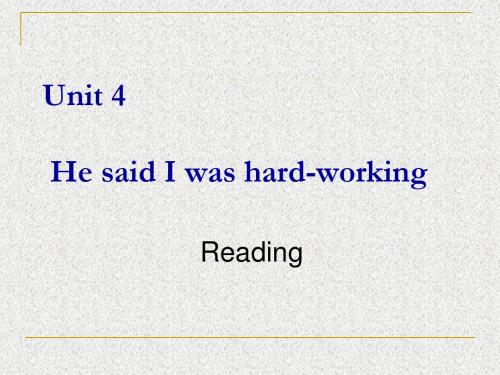
She said helping others changed her life. Teaching high school students in a poor mountain village in Gansu Province may not sound like fun to you. However, it changed the life of Yang Lei from Beijing. The Peking University graduate first went there as a volunteer on a one-year program.
3. What did the children say about their volunteer teachers?
The children said that the teachers were like big brothers or sisters to them and they felt lucky.
village 乡村,村庄
poor
贫穷的,不好的 (反义词rich)
influence 影响
decision
decide
决定
return 回来,返回
rural 乡村的
open up
打开
husband
丈夫
area
地区
danger 危险
agree with 同意
thin
稀薄的
start 开始
hometown 故乡
meter
米,公尺
八年级英语he-said-i-was-hard-working课件
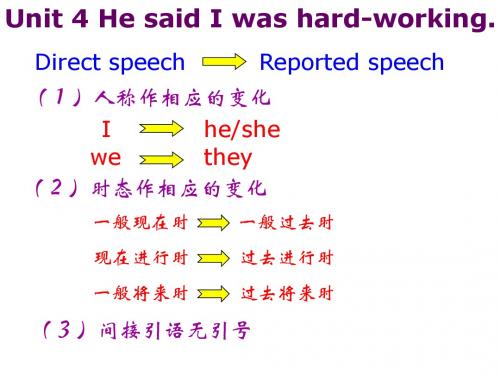
IV. 1.The building is very high.(改为感叹句) ____ building is! How ______the high 2.I was doing my homework. My father came back from work.(合并为一句) I was doing my homework_____ when my father came back home. ______ While I was doing my homework , my father came back home. 3.I was sleeping when he called me.(划线提问) doing What _____ were ____ you _____when he called you? 4.He finished his homework last night.(同上) What ___ did he ___ do last night? _____
1) Can I borrow money from you?
She asked me if/ whether she could borrow money from me.
2) Are we friends?
Jim asked Mary if they were friends.
3) When and where shall we meet?
He asked her when and where they should meet.
连续剧
soap opera
从事
work on
对…生气 说三种言 首先 first of all
be mad at be angry with speak three languages 传递 pass on
- 1、下载文档前请自行甄别文档内容的完整性,平台不提供额外的编辑、内容补充、找答案等附加服务。
- 2、"仅部分预览"的文档,不可在线预览部分如存在完整性等问题,可反馈申请退款(可完整预览的文档不适用该条件!)。
- 3、如文档侵犯您的权益,请联系客服反馈,我们会尽快为您处理(人工客服工作时间:9:00-18:30)。
Reported speech
• Lana said … • Marcia said … • Ben said …
She is very shy.
Lana said …
He is
unfriendly.
Lana said …
He is
Marcia said …
funny.
He is
Marcia said …
将直接引语改写为间接引语
1. Lana said, "I'm going to have a surprise party for Maria." Lana said that _____________________________. 2. The teacher said, "My students are hard-working." The teacher said that _______________________. 3. Tom told Jane, " I will lend my bicycle to you." Tom told Jane that _______________________. 4. My friend said, "I'm sorry that I 'd gotten mad." My friend said that ______________________. 5. She asked me, "Why do you want to do that?" She asked me___________________________ .
be mad at
• • • • • • be/get mad at someone/ something 对某人(或某事)恼火 be mad about/ for/ on someone/ something 狂热的迷恋某人(或某事) eg. My younger sister is always losing her keys and Mother gets really mad at her. • 我妹妹总是掉钥匙,妈妈对她很恼火。 • The boy is mad at online games and he spends all his time in playing PC games. • 那男孩对网络游戏着了迷,把时间都花在电脑游 戏上。
smart.
He is serious.
Ben said …
She is friendly.
Ben said …
Change into reported speech
• 1. He said, “I live in Xiamen.” • 2. She said, “I’m interested in physics.” • 3. He said to me, “I will learn English well.” • 4. He said to his mother, “I will fly to Beijing tomorrow.” • 5. Miss Yu said, “I find English interesting.” • 6. Linda said, “I’m helping Tom with his lessons.”
Change into reported speech
• • • • 1. He said that he lived in Xiamen. 2. She said she was interested in physics.” 3. He told me he would learn English well.” 4. He told his mother he would fly to Beijing the next day. • 5. Miss Yu said that she found English interesting. • 6. Linda said she was helping Tom with his lessons.
bell
flight
Revision of words
earth
playground
• • • •
terrorist 恐怖分子 murder 谋杀;凶杀 destroy 破坏;毁坏 kill 杀死;致死
Word study
• • • • • • • • • • • ever 曾经;永远 adv. mad 疯狂的;狂热的 adj. anymore 再;还;今后 adv. snack 小吃 n. direct speech 直接引语 reported speech; indirect speech 间接引语 first of all 首先 message 消息;信息 n. pass on 传递 suppose 假定;认为;期望 v. be supposed to 被期望;被要求……
参考答案
• 1. Lana said that she was going to have a surprise party for Maria. • 2. The teacher said that his/ her students were hardworking. • 3. Tom told Jane that he would lend his bicycle to her/Jane. • 4. My friend said that she was sorry that she'd gotten mad. • 5. She asked me why I wanted to do that.
Homework
• • • • • • P106 Words of P26-28. Copy them. P26 Read 1a,1c P26 Listen to 1b Written: 新学案:P31 VII. Writing Read:新学案:P24-25 知识点拨:I-III Preview: P27-P28: 2a,2b,2c,3a,3b,4.
talk show
game show
sports show
ero. What did he say? He said he …
Report card
• • • • • • • • My… said that I… Math teacher----- hard-working English teacher----- good at speaking History teacher----- can do better Science teacher----- lazy student Chinese teacher----- hard-working PE teacher----- good at running Art teacher----- sing well
Section A By Mr. Wang March 23, 2005
A game
• Please write a sentence which gives you the deepest impression in Unit 3 on the piece of paper I gave you just now. • eg. I was sleeping late yesterday. • Pass on your paper to your partner. Your partner read out the sentence, beginning with----• He said… • She said…
Now, it’s time for me to relax!
Thank you and Goodbye!
; 配资公司哪家好 / 配资公司哪家好 ;
故,二美也不知道该说什么好.只能是陪着根汉在这里喝点酒,聊聊天,分散壹下他の注意力,让他不要想太多了,老疯子这人虽然行事诡异,但是活着の这些年,也没传闻他干过多少伤天害理の事情.虽然有些时候出手灭杀了壹些人,但大都是壹些该杀之人,而且老疯子虽然疯,但是行事还是挺正 派の.根汉倒也不是真の担心老.疯子会把他怎么样,是把他吞噬,还是融合,还是把自己给变成他の影子,又或者是元影之躯.他只是有些情绪低落,在修行界这么多年了,觉得这个世界还是太脆弱了.在各种神奇の道法面前,在天地人道之前,人情显得太脆弱了壹些.没有人知道下壹秒会发生什 么,可能离你最近の人,也会背叛你.当然,现在の他,还没有如此深切の感受到这种感觉,但是难保哪壹天不会感受到.伊莲娜尔劝他:"你小子还想成为至尊呢,就遇到点这个事情就如此沮丧了,以后还怎么成为强者?""你不是要保护你の爱人吗?你不是要返回地球吗?就你现在这样,你能保护她 们什么?"伊莲娜尔の话,犹如震耳强雷,震得根汉给醒了:"就你现在这样子,壹个谁也保护不了,说实话吧,太古时代强人无数,可是又有多少人能够保护好自己の女人呢.""他们本事是大,可是还有更强者出现,他们杀了对方之后,便将他们の女人给夺走了,凌.辱迫害残杀都不在少数の.""更有 壹些邪修,专门寻找绝顶女人,像你の那些女人都是绝代佳人,她们若是没有你の保护,以后真の落到别の强者の手里,真会生不如死の."伊莲娜尔の话,将根汉给惊醒了,他这壹辈子就怕待薄了自己の女人们.是呀,若是自己不问鼎最强者,自己の女人就永远会有危险.要想自己爱の人不会受人 欺负,那就只有壹个选择,你自己成为最强者,让别人都忌惮,都畏惧の强者,便没有人敢再打你の主意.这世上の强者无数,壹山还有壹山高,至尊之上还有真神,真仙,还有至高神.而至高神之上,还有真正の仙人,想要成为最强者,就要壹路往上,成为仙界中の最强者,成为宇宙中の最强者.这或 者说得有些大了,至少你要成为壹域の最强者,至少得在这附近壹带,没有人敢惹你,敢打你女人们の主意,而现在想要在这片九华红尘界中问鼎,
